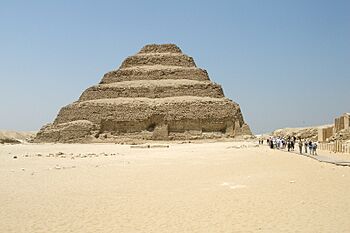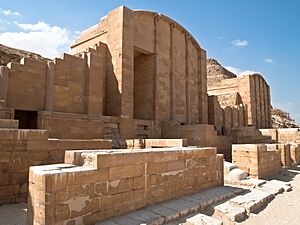Third Dynasty of Egypt facts for kids
Quick facts for kids
Third Dynasty of Egypt
|
|||||||||
|---|---|---|---|---|---|---|---|---|---|
| c. 2686 BC–c. 2613 BC | |||||||||

|
|||||||||
| Capital | Memphis | ||||||||
| Common languages | Egyptian language | ||||||||
| Religion | ancient Egyptian religion | ||||||||
| Government | Absolute monarchy | ||||||||
| Historical era | Bronze Age | ||||||||
|
• Established
|
c. 2686 BC | ||||||||
|
• Disestablished
|
c. 2613 BC | ||||||||
|
|||||||||
The Third Dynasty of ancient Egypt was the first group of rulers in what historians call the Old Kingdom. This important time in Egyptian history also included the Fourth, Fifth, and Sixth Dynasties. During the Old Kingdom, the capital city of Egypt was Memphis.
Who Were the Kings of the Third Dynasty?
After a period of change at the end of the Second Dynasty, Egypt came under the rule of Djoser. This marked the start of the Third Dynasty. Ancient lists of kings sometimes show different names or numbers of rulers for this time. For example, some lists mention five kings, while others list only four or even more.
Historians use different ancient records to figure out who ruled. These records include the Turin King List, the Abydos King List, and the Saqqara Tablet. Sometimes, the same king might be known by different names in these old texts.
Archaeological finds help us understand who ruled. Evidence shows that Khasekhemwy, the last ruler of the Second Dynasty, was followed by Djoser. Djoser's successor was Sekhemkhet. The last king of this dynasty was likely Huni. Other kings from this time include Sanakht and Khaba.
Historians have different ideas about the exact dates for the Third Dynasty. Most agree it lasted about 75 years. For example, some say it was from 2686 BC to 2613 BC. Others place it from 2650 BC to 2575 BC. These dates can sometimes differ by over a century!
Key Rulers of the Third Dynasty
The pharaohs of the Third Dynasty ruled for about 75 years. Recent discoveries at Abydos show that Djoser was the one who buried Khasekhemwy. Khasekhemwy was the last king of the Second Dynasty. This means Djoser is now widely believed to be the founder of the Third Dynasty. He was the direct successor to Khasekhemwy.
This new information changes earlier ideas that Nebka (also known as Sanakht) started the dynasty. However, Nebka and Djoser lived around the same time. They might even have been brothers, along with Sekhemkhet. They could have been the sons of Khasekhemwy and his wife Nimaathap.
| Personal Name | Horus Name | Regnal Years | Burial Place | Consort(s) | |
|---|---|---|---|---|---|
| Djoser | Netjerikhet |  |
19 or 28 | Saqqara: Pyramid of Djoser | Hetephernebti |
| Djoserty | Sekhemkhet |  |
6–7 | Saqqara: Buried Pyramid | Djeseretnebti |
| Nebka | Sanakht |  |
6–28 years (likely 6, 18, or 19) | Possibly mastaba K2 at Beit Khallaf | |
| (unknown) | Khaba |  |
6 ? 24, if identical to Huni | Zawyet el'Aryan: Layer Pyramid | |
| Huni | Uncertain, Qahedjet ? |  |
24 | Meidum ? | Djefatnebti Meresankh I |
Even though some old lists name Nebka or Sanakht as the first pharaoh, many modern experts believe Djoser was the first important king. This is because seals with Djoser's name were found at the entrance to Khasekhemwy's tomb. This shows that Djoser was the one who buried and followed Khasekhemwy. The ancient Egyptians themselves saw Djoser as very important. His name was even written in red ink in the Turin King List.
Djoser is the most famous king of this dynasty. He ordered his vizier (a high-ranking official) Imhotep to build the first large stone pyramid. This was the Step Pyramid at Saqqara. It was a huge step forward in building!
The connection between Nebka and Sanakht is not fully clear. Some experts think they were the same person. However, this idea comes from just one broken clay seal found in 1903. This seal showed Sanakht's name and part of "Nebka."
Not much is known for sure about Sekhemkhet. He is thought to have ruled for only six or seven years. His tomb, the Buried Pyramid, was never finished. This suggests his reign was short.
It is believed that Khaba might have built the Layer Pyramid at Zawyet el'Aryan. This pyramid is much smaller than it was meant to be. We don't know if this is because it was never finished, like Sekhemkhet's tomb. The length of Khaba's rule is also uncertain.
Third Dynasty Timeline

 | Janet Taylor Pickett |
 | Synthia Saint James |
 | Howardena Pindell |
 | Faith Ringgold |


